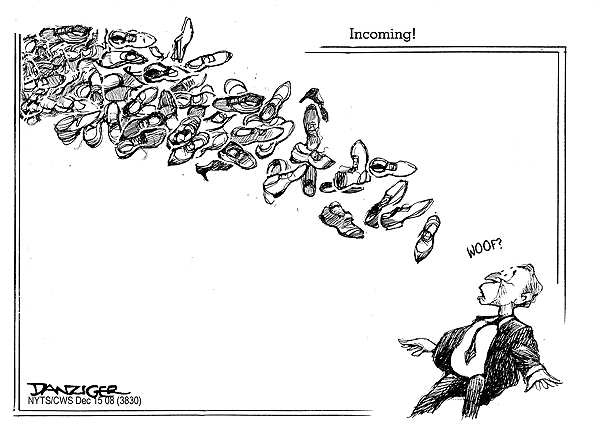By the last days of March 2002, more than six months after 9/11, President George W. Bush's promise "to hunt down and to find those folks who committed this act" was starting to sound a little hollow. True, Afghanistan had been invaded and the Taliban toppled from power. But Osama bin Laden had vanished from the caves of Tora Bora, and none of his key al-Qaeda lieutenants were in U.S. captivity. Intelligence about what the terrorists might be planning next was almost nonexistent. "The panic in the executive branch was palpable," recalls Mike Scheuer, the former C.I.A. official who set up and ran the agency's Alec Station, the unit devoted to tracking bin Laden.

Clockwise from top left: al-Qaeda lieutenant Abu Zubaydah; al-Qaeda operative Khalid Sheikh Mohammed shortly after his capture, in 2003; terror suspect Jose Padilla; former British resident and current Guantánamo Bay detainee Binyam Mohamed.
Early in the morning of March 28, in the moonlit police-barracks yard in Faisalabad, Pakistan, hopes were high that this worrisome intelligence deficit was about to be corrected. Some 300 armed personnel waited in silence: 10 three-man teams of Americans, drawn equally from the C.I.A. and the F.B.I., together with much greater numbers from Pakistan's police force and Inter-services Intelligence (ISI). In order to maximize their chances of surprise, they planned to hit 10 addresses simultaneously. One of them, they believed, was a safe house containing a man whose name had been familiar to U.S. analysts for years: Zayn al-Abidin Muhammad Hussein, a 30-year-old Saudi Arabian better known as Abu Zubaydah. "I'd followed him for a decade," Scheuer says. "If there was one guy you could call a 'hub,' he was it."
The plan called for the police to go in first, followed by the Americans and ISI men, whose job would be to gather laptops, documents, and other physical evidence. A few moments before three a.m., the crackle of gunfire erupted. Abu Zubaydah had been shot and wounded, but was alive and in custody. As those who had planned it had hoped, his capture was to prove an epochal event—but in ways they had not envisaged.
Four months after Abu Zubaydah's capture, two lawyers from the Department of Justice, John Yoo and Jay Bybee, delivered their notorious memo on torture, which stated that coercive treatment that fell short of causing suffering equivalent to the pain of organ failure or death was not legally torture, an analysis that—as far as the U.S. government was concerned—sanctioned the abusive treatment of detainees at the C.I.A.'s secret prisons and at Guantánamo Bay. But, as Jane Mayer writes in her recent book, The Dark Side (Doubleday), Abu Zubaydah had been subjected to coercive interrogation techniques well before that, becoming the first U.S. prisoner in the Global War on Terror to undergo waterboarding.


Katherine Eban on the C.I.A.'s coercive interrogation techniques (July 2007).
David Rose on Guantánamo Bay (January 2004).
The case of Abu Zubaydah is a suitable place to begin answering some pressing but little-considered questions. Putting aside all legal and ethical issues (not to mention the P.R. ramifications), does such treatment—categorized unhesitatingly by the International Committee of the Red Cross as torture—actually work, in the sense of providing reliable, actionable intelligence? Is it superior to other interrogation methods, and if they had the choice, free of moral qualms or the fear of prosecution, would interrogators use it freely?
President Bush has said it works extremely well, insisting it has been a vital weapon in America's counterterrorist arsenal. Vice President Dick Cheney and C.I.A. director Michael Hayden have made similar assertions. In fact, time and again, Bush has been given opportunities to distance his administration from the use of coercive methods but has stood steadfastly by their use. His most detailed exposition came in a White House announcement on September 6, 2006, when he said such tactics had led to the capture of top al-Qaeda operatives and had thwarted a number of planned attacks, including plots to strike U.S. Marines in Djibouti, fly planes into office towers in London, and detonate a radioactive "dirty" bomb in America. "Were it not for this program, our intelligence community believes that al-Qaeda and its allies would have succeeded in launching another attack against the American homeland. By giving us information about terrorist plans we could not get anywhere else, this program has saved innocent lives."
Really? In researching this article, I spoke to numerous counterterrorist officials from agencies on both sides of the Atlantic. Their conclusion is unanimous: not only have coercive methods failed to generate significant and actionable intelligence, they have also caused the squandering of resources on a massive scale through false leads, chimerical plots, and unnecessary safety alerts—with Abu Zubaydah's case one of the most glaring examples.
Here, they say, far from exposing a deadly plot, all torture did was lead to more torture of his supposed accomplices while also providing some misleading "information" that boosted the administration's argument for invading Iraq.
Everything that was to go wrong with the interrogation of Abu Zubaydah flowed from a first, fatal misjudgment. Although his name had long been familiar to the C.I.A., that did not make him an operational terrorist planner or, as Bush put it in September 2006, "a senior terrorist leader and a trusted associate of Osama bin Laden." Instead, Scheuer says, he was "the main cog in the way they organized," a point of contact for Islamists from many parts of the globe seeking combat training in the Afghan camps. However, only a tiny percentage would ever be tapped for recruitment by al-Qaeda.
According to Scheuer, Abu Zubaydah "never swore bayat [al-Qaeda's oath of allegiance] to bin Laden," and the enemy he focused on was Israel, not the U.S. After Abu Zubaydah's capture, Dan Coleman, an F.B.I. counterterrorist veteran, had the job of combing through Abu Zubaydah's journals and other documents seized from his Faisalabad safe house. He confirms Scheuer's assessment. "Abu Zubaydah was like a receptionist, like the guy at the front desk here," says Coleman, gesturing toward the desk clerk in the lobby of the Virginia hotel where we have met. "He takes their papers, he sends them out. It's an important position, but he's not recruiting or planning." It was also significant that he was not well versed in al-Qaeda's tight internal-security methods: "That was why his name had been cropping up for years."
Declassified reports of legal interviews with Abu Zubaydah at his current residence, Guantánamo Bay, suggest that he lacked the capacity to do much more. In the early 1990s, fighting in the Afghan civil war that followed the Soviet withdrawal, he was injured so badly that he could not speak for almost two years. "I tried to become al-Qaeda," Abu Zubaydah told his lawyer, Brent Mickum, "but they said, 'No, you are illiterate and can't even remember how to shoot.'" Coleman found Abu Zubaydah's diary to be startlingly useless. "There's nothing in there that refers to anything outside his head, not even when he saw something on the news, not about any al-Qaeda attack, not even 9/11," he says. "All it does is reveal someone in torment. Based on what I saw of his personality, he could not be what they say he was."
In May 2008, a report by Glenn Fine, the Department of Justice inspector general, stated that, as he recovered in the hospital from the bullet wounds sustained when he was captured, Abu Zubaydah began to cooperate with two F.B.I. agents. It was a promising start, but "within a few days," wrote Fine, he was handed over to the C.I.A., whose agents soon reported that he was providing only "throw-away information" and that, according to Fine, they "needed to diminish his capacity to resist." His new interrogators continued to question him by very different means at so-called black-site prisons in Thailand and Eastern Europe. They were determined to prove he was much more important than the innkeeper of a safe house.
Bush discussed Abu Zubaydah's treatment in his 2006 announcement. "As his questioning proceeded, it became clear that he had received training on how to resist interrogation. And so the C.I.A. used an alternative set of procedures…. The procedures were tough, and they were safe, and lawful, and necessary." Soon, Bush went on, Abu Zubaydah "began to provide information on key al-Qaeda operatives, including information that helped us find and capture more of those responsible for the attacks on September 11." Among them, Bush said, were Khalid Sheikh Mohammed, the alleged 9/11 mastermind, and his fellow conspirator Ramzi Binalshibh. In fact, Binalshibh was not arrested for another six months and K.S.M. not for another year. In K.S.M.'s case, the lead came from an informant motivated by a $25 million reward.
As for K.S.M. himself, who (as Jane Mayer writes) was waterboarded, reportedly hung for hours on end from his wrists, beaten, and subjected to other agonies for weeks, Bush said he provided "many details of other plots to kill innocent Americans." K.S.M. was certainly knowledgeable. It would be surprising if he gave up nothing of value. But according to a former senior C.I.A. official, who read all the interrogation reports on K.S.M., "90 percent of it was total fucking bullshit." A former Pentagon analyst adds: "K.S.M. produced no actionable intelligence. He was trying to tell us how stupid we were."
It is, perhaps, a little late, more than six years after detainees began to be interrogated at Guantánamo Bay and at the C.I.A.'s black-site prisons, to be asking whether torture works. Yet according to numerous C.I.A. and F.B.I. officials interviewed for this article, at the time this question really mattered, in the months after 9/11, no one seriously addressed it. Those who advocated a policy that would lead America to deploy methods it had always previously abhorred simply assumed they would be worthwhile. Non-governmental advocates of torture, such as the Harvard legal scholar Alan Dershowitz, have emphasized the "ticking bomb" scenario: the hypothetical circumstance when only torture will make the captured terrorist reveal where he—or his colleagues—has planted the timed nuclear device. Inside the C.I.A., says a retired senior officer who was privy to the agency's internal debate, there was hardly any argument about the value of coercive methods: "Nobody in intelligence believes in the ticking bomb. It's just a way of framing the debate for public consumption. That is not an intelligence reality."
There is, alas, no shortage of evidence from earlier times that torture produces bad intelligence. "It is incredible what people say under the compulsion of torture," wrote the German Jesuit Friedrich von Spee in 1631, "and how many lies they will tell about themselves and about others; in the end, whatever the torturers want to be true, is true."
The unreliability of intelligence acquired by torture was taken as a given in the early years of the C.I.A., whose 1963 kubark interrogation manual stated: "Intense pain is quite likely to produce false confessions, concocted as a means of escaping from distress. A time-consuming delay results, while investigation is conducted and the admissions are proven untrue. During this respite the interrogatee can pull himself together. He may even use the time to think up new, more complex 'admissions' that take still longer to disprove."
A 1957 study by Albert Biderman, an Air Force sociologist, described how brainwashing had been achieved by depriving prisoners of sleep, exposing them to cold, and forcing them into agonizing "stress positions" for long periods. In July 2008, The New York Times reported that Biderman's work formed the basis of a 2002 interrogators' training class at Guantánamo Bay. That the methods it described had once been used to generate Communist propaganda had apparently been forgotten.
Experience derived from 1990s terrorism cases also casts doubt on torture's value. For example, in March 1993, F.B.I. agents flew to Cairo to take charge of an Egyptian named Mahmud Abouhalima, who would be convicted for having bombed the World Trade Center a month earlier. Abouhalima had already been tortured by Egyptian intelligence agents for 10 days, and had the wounds to prove it. As U.S. investigators should have swiftly realized, his statements in Egypt were worthless, among them claims that the bombing was sponsored by Iranian businessmen, although, apparently, their sworn enemy, Iraq, had also played a part.
In the fall of 2001, publications such as Newsweek, The Washington Post, and The Wall Street Journal ran articles suggesting torture might be essential to prevent further attacks. All cited the case of Abdul Hakim Murad, a Pakistani terrorist in possession of explosives arrested in the Philippines in January 1995, who was later convicted in New York. According to Dershowitz, his coerced confessions about the "Bojinka" plot, to blow up 11 airliners over the Pacific, supported the claim that "torture sometimes does work and can sometimes prevent major disasters."
Murad was certainly tortured. At his trial in 1996, transcripts of his interrogation by the Philippines National Police contained pauses and gasps, which his lawyer claimed were the result of his enduring a procedure much like waterboarding. But did it really pay intelligence dividends? With Murad's arrest, the plot was blown. As Professor Stephanie Athey of Lasell College noted in a 2007 article, Dershowitz's claim that the torture prevented a major disaster is false. A computer seized in Murad's apartment held details of the flights he planned to attack, detonator-timer settings, and photos of some of his co-conspirators, together with their aliases, so enabling their subsequent arrest. It was this, Mike Scheuer says, not Murad's interrogation, that provided more useful intelligence.
Equally significant was what Murad didn't give up under torture. Bojinka was partly the brainchild of none other than Khalid Sheikh Mohammed, later alleged to be the chief planner of 9/11. He had been living in the Philippines, but apparently Murad said nothing that might have helped his interrogators find him: he was not captured until 2003.
On April 10, 2002, 13 days after Abu Zubaydah's capture, in Faisalabad, a 23-year-old Ethiopian named Binyam Mohamed was detained at the airport in Karachi, Pakistan, attempting to board a flight to London, where he had been living for seven years. Information about the case drawn up by the British security service M.I.5, and obtained by Vanity Fair, suggests that if Mohamed was a terrorist his tradecraft was unimpressive: he was stopped because he was using a passport that obviously belonged to someone else, his friend Fouad Zouaoui—the second time that Mohamed had tried to leave Pakistan on Zouaoui's papers. He also had a heroin problem.
In notes by his attorney, Clive Stafford Smith, made from days of interviews with him at Guantánamo, the picture that emerges is one more of naïveté than wickedness. He said he went to Pakistan, and then Afghanistan, in June 2001, partly because he wanted to kick his drug habit (arguably, the world's biggest source of opium was not an ideal place) and partly to ascertain whether Taliban-controlled Afghanistan was a "good Islamic country." In any event, there is no dispute that he fled across the border into Pakistan as soon as he could after 9/11.
The first 10 days of Mohamed's detention, at Landi prison, near Karachi, were not, on his account, comfortable, but he was not tortured or abused. But after he was moved to a Pakistani security jail, around April 20, he began to be abused. A few days later, when he was questioned for the first time by U.S. agents, his treatment worsened dramatically.
"They seemed to think I was some kind of top al-Qaeda person," Mohamed said. "How? It was less than six months since I converted to Islam, and before that I was using drugs!" After the Americans' visit, Mohamed said, he was hung by his wrists for hours on end, so that his feet barely touched the ground. Suspended thus, he said, he was beaten regularly by Pakistani guards. He said he was also threatened with a gun.
U.S. interest in Mohamed appears to have been triggered by an unlucky coincidence. It so happened that in the period in early April before Abu Zubaydah's torture began, when he was starting to cooperate with the F.B.I., he gave up the name of one of those who had passed through his safe house en route to an Afghan camp—that of Jose Padilla, a former Chicago gang member. "He probably remembered Padilla because he was a U.S. citizen, and that was rare," says the former F.B.I. al-Qaeda specialist Dan Coleman.
Mohamed has maintained that if he had ever met Padilla it would have been a fleeting, chance encounter, perhaps when they both fled Afghanistan, and he has no memory of it. But the first time Mohamed tried to fly to London via Zurich, around April 4, Padilla was booked on the same flight. Their ultimate destinations were different: Padilla planned to spend time in Egypt before returning to Chicago. But the fact they were starting their journeys together, says an F.B.I. agent who attended official briefings about the case, convinced American agencies that they shared some joint purpose. "It was simply that—flight coincidence," he says. "I never saw any evidence that Padilla and Mohamed met."
By late April, Abu Zubaydah was being tortured and giving up details of a plot that sounded truly terrifying: a plan for Padilla to build and detonate a radioactive dirty bomb in America. But even at the outset, some who worked in U.S. counterterrorism were skeptical. "If there is a dirty bomb, you'd better take it seriously, because as bad as 9/11 was, a dirty bomb would be a hundred times worse," says the former F.B.I. agent who attended the case briefings. "It was clear that Padilla had some form of training, that he was a sympathizer. But to claim he really had a plan to do a dirty bomb? That's tough. You show me he knew how to go and get it. That he knew how to make it. They never had that."
Convinced that the dirty-bomb plot was real, those interrogating Binyam Mohamed assumed that he must be part of it, and if he could not fill in missing details, he must have been covering up. Agents such as the F.B.I.'s Jack Cloonan, who spent years fighting al-Qaeda before his retirement in 2002, had learned that it had an impressive "quality-control system," which meant "they looked for people with the right makeup, they did their own due diligence, and they would not pick weak guys"—not, typically, heroin addicts. But no one was listening to these agents.
M.I.5 seems to have shared the C.I.A.'s groupthink. Sources in London say that its agents also assumed that anything Mohamed said to try to defend himself must be a lie. One admission he did make was that he had seen a Web site with instructions on how to make a hydrogen bomb, but he was apparently claiming it was a joke. The intelligence agencies believed this was a smoking gun, notwithstanding Mohamed's bizarre statement that the instructions included mixing bleach with uranium-238 in a bucket and rotating it around one's head for 45 minutes. Neither the British nor the Americans thought Mohamed's claim that the Web site was a joke was credible: his "confession" to reading instructions about building nuclear weapons on the Internet was cited in Mohamed's Guantánamo charge sheet. Yet it was a joke: such a Web site, with instructions about how to refine bomb-grade uranium with bleach and a bucket, has been doing the rounds on the World Wide Web since at least 1994. In 2005, the conservative columnist Michelle Malkin cited it in her blog as evidence of al-Qaeda's deadly intentions. She was swiftly disabused by readers, who, unlike the C.I.A. and M.I.5, immediately recognized it as satire.
But even M.I.5 couldn't help but notice "glaring inconsistencies" among the different accounts of the plot being given by those getting interrogated. And instead of asking whether the plot was real, the investigators seem to have assumed that the different accounts of those being interrogated were merely an attempt to protect al-Qaeda operations.
Clive Stafford Smith believes that the weakness of the dirty-bomb charge against Padilla may well explain what happened to Binyam Mohamed: "Maybe what they were trying to do was turn him into a prosecution witness." After all, he had already confessed in Pakistan, under torture that had been, in comparison with what was to come, relatively mild. But on July 21, 2002, as the plane's flight log later confirmed, he was flown aboard a Gulfstream V jet chartered by the C.I.A. to Rabat, in Morocco. There he was to spend the next 18 months.
With the help of Stafford Smith, he later assembled a diary describing his treatment there. Amid numerous beatings in Rabat, Mohamed wrote, "They'd ask me a question. I'd say one thing. They'd say it was a lie. I'd say another. They'd say it was a lie. I could not work out what they wanted to hear." He also said the Moroccans repeatedly cut his chest and genitals with a razor. Finally he was subjected to further harsh treatment in the "Dark Prison" near Kabul, Afghanistan, after being spirited away on another C.I.A. flight in January 2004.
After another nine months, he was brought to Guantánamo, where he remains. He filed a habeas corpus lawsuit in federal court in the District of Columbia, a claim that there was no credible reason for his continued detention, and in its attempt to defend this, the administration in October 2008 dropped all mention of the dirty-bomb plot. In Guantánamo's parallel quasi-legal world of military commissions, where the rules make it much harder to exclude evidence derived from torture, the Pentagon in May 2008 issued a charge sheet against Mohamed. It said that having trained in various al-Qaeda camps and taken instruction from bin Laden, Mohamed "reviewed technical information concerning the construction of an improvised radioactive bomb" with K.S.M. and decided with Padilla to detonate one in America.
In October, the charges were withdrawn, after the prosecutor, Lieutenant Colonel Darrel Vandeveld, resigned. Later he told the BBC he had concerns at the repeated suppression of evidence that could prove prisoners' innocence. Meanwhile, as of December 2008, Mohamed's lawyers were fighting separate court cases to force the U.S. government in Washington and the British government in London to disclose all the information they have about Mohamed's treatment. (Coincidentally, my sister, Dinah Rose, Q.C., is representing Mohamed in the London case.) Stafford Smith is bound by Draconian restrictions that prevent him from offering any but the blandest comments about the evidence in his client's case. He says, "I know of no evidence against him other than his own confessions, all of which are the bitter fruit of his abuse."
"There was no dirty-bomb plot. I'm sure it was just Abu Zubaydah trying to get them excited," says the F.B.I.'s Dan Coleman. "There's never been any corroboration except the confessions of Binyam Mohamed under torture. No one was willing to take their time." But, in the words of the former C.I.A. official Mike Scheuer, "That dirty-bomb business put the fear of God into these people in the administration." As a result, he says, "they may well have sent Binyam Mohamed somewhere where the authorities would do things we wouldn't—or couldn't."
On June 10, 2002, then attorney general John Ashcroft interrupted a visit to Moscow to speak to reporters: "I am pleased to announce today a significant step forward in the war on terrorism. We have captured a known terrorist who was exploring a plan to build and explode a radiological dispersion device, or 'dirty bomb,' in the United States." He meant Jose Padilla, who had been arrested as he flew into Chicago on May 8. The president, Ashcroft said, had designated Padilla an "enemy combatant," and he had been removed from civilian custody to a navy brig. In due course, Ashcroft said, he would be tried by a military commission.
"Let me be clear: we know from multiple independent and corroborating sources that Abdullah Al Mujahir [Padilla's nom de guerre] was closely associated with al-Qaeda and that … he was involved in planning future terrorist attacks on innocent American civilians in the United States," Ashcroft said. Had his dirty bomb gone off, it could have caused "mass death and injury."
The shakiness of Ashcroft's "multiple independent and corroborating sources" claim was demonstrated by an affidavit from an F.B.I. agent, Joe Ennis, in support of Padilla's detention. Referring to Binyam Mohamed as "Subject-1," it said that his "wife" had told law-enforcement authorities that he "would often become emotional and cry when he discussed his willingness to die for his God." Strangely enough, Mohamed was and remains unmarried.
Mohamed, the affidavit said, "has not been completely candid about his association with Al Qaeda, and his own terrorist activities," and was trying to "mislead or confuse U.S. law enforcement." But it was clear that after weeks of abuse he had started to crack. According to Ennis, he had already told his interrogators that he and Padilla had "researched the construction of a uranium-enhanced explosive device"; that Padilla had been to meetings with al-Qaeda officials; and that he believed Padilla had been ordered to return to America.
In the brig, Padilla's attorneys claimed, he too was tortured. He was deprived of all contact with the outside world for two and a half years, and, according to one court filing, "He would be shackled and manacled, with a belly chain, for hours in his cell. Noxious fumes would be introduced to his room causing his eyes and nose to run. The temperature of his cell would be manipulated, making the cell extremely cold for long stretches of time." Chained in agonizing "stress positions" repeatedly, he was also allegedly "threatened with imminent execution.… Often he had to endure multiple interrogators who would scream, shake, and otherwise assault [him]."
The government did not deny these assertions, only the claim that they amounted to torture. Donna Newman, Padilla's attorney before he was taken to the brig, says that afterward "he was not the same person. Beforehand, he was engaged in his case; he asked pertinent questions. When I saw him again, he hardly said a word. He had no interest in what was happening, even though his case was nearing the Supreme Court."
Under this pressure, Padilla produced ever more elaborate confessions. Former deputy attorney general James Comey said in June 2004 that Padilla spoke of discussing the dirty bomb with Khalid Sheikh Mohammed, of an instruction from K.S.M. to blow up apartments by filling them with gas and igniting it, and of a dinner party with Binyam Mohamed, K.S.M., and al-Qaeda bigwigs the night before he left Pakistan.
Very senior officials had a lot invested in Padilla. But in November 2005, three days before the Justice Department was to file a brief before the Supreme Court in response to his lawyers' claim that his treatment was unconstitutional, the administration returned him to civilian custody. With all mention of the dirty-bomb plot deleted, he stood trial in Florida on far less serious charges of conspiracy to murder, maim, and kidnap, and providing material support to terrorist organizations, and in January 2008 he was sentenced to 17 years and four months in prison. "The dirty-bomb plot was simply not credible," Jack Cloonan says. "The government would never have given up that case if there was any hint of credibility to it. Padilla didn't stand trial for it, because there was no evidence to support it."
On March 27, 2007, Abu Zubaydah was able to make a rare public statement, at a "Combatant Status-Review Tribunal" at Guantánamo—a military hearing convened to determine whether he should continue to be detained. Everything he said about the details of his treatment was redacted from the unclassified record. But a few relevant remarks remain: "I was nearly before half die plus [because] what they do [to] torture me. There I was not afraid from die because I do believe I will be shahid [martyr], but as God make me as a human and I weak, so they say yes, I say okay, I do I do, but leave me. They say no, we don't want to. You to admit you do this, we want you to give us more information … they want what's after more information about more operations, so I can't. They keep torturing me."
The tribunal president, a colonel whose name is redacted, asked him: "So I understand that during this treatment, you said things to make them stop and then those statements were actually untrue, is that correct?" Abu Zubaydah replied: "Yes."
Some of those statements, say two senior intelligence analysts who worked on them at the time, concerned the issue that in the spring of 2002 interested the Bush administration more than almost any other—the supposed operational relationship between al-Qaeda and Iraq. Given his true position in the jihadist hierarchy, Abu Zubaydah "would not have known that if it was true," says Coleman. "But you can lead people down a course and make them say anything."
Some of what he did say was leaked by the administration: for example, the claim that bin Laden and his ally Abu Musab al-Zarqawi were working directly with Saddam Hussein to destabilize the autonomous Kurdish region in northern Iraq. There was much more, says the analyst who worked at the Pentagon: "I first saw the reports soon after Abu Zubaydah's capture. There was a lot of stuff about the nuts and bolts of al-Qaeda's supposed relationship with the Iraqi Intelligence Service. The intelligence community was lapping this up, and so was the administration, obviously. Abu Zubaydah was saying Iraq and al-Qaeda had an operational relationship. It was everything the administration hoped it would be."
Within the administration, Abu Zubaydah's interrogation was "an important chapter," the second analyst says: overall, his interrogation "product" was deemed to be more significant than the claims made by Ibn al-Shaykh al-Libi, another al-Qaeda captive, who in early 2002 was tortured in Egypt at the C.I.A.'s behest. After all, Abu Zubaydah was being interviewed by Americans. Like the former Pentagon official, this official had no idea that Abu Zubaydah had been tortured.
"As soon as I learned that the reports had come from torture, once my anger had subsided I understood the damage it had done," the Pentagon analyst says. "I was so angry, knowing that the higher-ups in the administration knew he was tortured, and that the information he was giving up was tainted by the torture, and that it became one reason to attack Iraq."
One result of Abu Zubaydah's torture was that the F.B.I.'s assistant director for counterterrorism, Pasquale D'Amuro, persuaded Director Robert Mueller that the bureau should play no part in future C.I.A. interrogations that used extreme techniques forbidden by the F.B.I. The Justice Department's Glenn Fine indicated in a statement before the U.S. Senate that the main reason was that the agency's techniques would "not be effective in obtaining accurate information."
If torture doesn't work, what does? The evidence suggests that when the Bush administration decided to ignore many of America's most experienced counterterrorist agents and go for torture in 2001 and 2002, it shut down rich sources of intelligence. In the biggest terrorist case of the 1990s, the bombings of the U.S. Embassies in Kenya and Tanzania in 1998 that killed more than 220 people, the F.B.I.'s Cloonan and his colleagues were able to persuade three of the main conspirators not only to talk to them but also to give prosecution testimony in court. Here Morocco, the U.S. ally where Binyam Mohamed was sent to be tortured in 2002, provided assistance of a very different order. Eighteen months after the attacks, Cloonan traced L'Houssaine Kherchtou, also known as Joe the Moroccan, an al-Qaeda operative who had played a key role, to his hiding place, in Sudan. The Moroccans concocted a story to lure him home, and when he arrived in Rabat he was arrested.

After reports of Abu Zubaydah's torture, F.B.I. director Robert Mueller—pictured here before the Senate Intelligence Committee in February 2008—agreed that the bureau should play no part in future C.I.A. interrogations that use extreme techniques. By Ken Cedeno/Bloomberg News/Landov.
Cloonan says, "We all went to a beautiful safe house outside of town, with gazelles bouncing around in the grounds and three solid meals fit for a king each day. We all sat on sofas in a big room—me, Ali Soufan [an F.B.I. colleague], Pat Fitzgerald [the U.S. attorney then in charge of a special counterterrorist section in New York], a C.I.A. guy, and two Moroccan colonels. The Moroccans said he'd never talk. He never shut up for 10 days." Cloonan had done his homework: "His wife needed money for medical treatment in Khartoum, and al-Qaeda had failed to provide it." That gave Cloonan his "in."
The intelligence Kherchtou provided, at a time when U.S. knowledge about al-Qaeda was still perfunctory, was invaluable. "He told us about a lot of things," says Cloonan. "We learned how they recruited people, their front organizations, how they used NGOs, false passports, what they thought about kidnapping, how they developed targets, did their surveillance, a day in the life of Osama bin Laden, what weapons they used, what vehicles they drove, who was the principal liaison with the Sudanese government, that there was a relationship between al-Qaeda and Hezbollah, how they did their training exercises, their finances, and their membership."
Finally Fitzgerald offered Kherchtou a deal: if he came to New York, pleaded guilty, and testified against the bombers, Fitzgerald would ask the judge to treat him leniently. At first, it looked as if he was going to turn it down. Then, Cloonan says, "I said, 'Joe, you understand English, so I'd like you to go out and pray on this with your two Moroccan brothers.' I thought Fitzy was going to give birth. Joe went out and prayed and came back and said yes." Kherchtou is now in the federal witness-protection program. Thanks in part to his testimony, four of his onetime associates are serving life.
To reach a final calculus of the Bush administration's use of torture will take years. It will require access to a large body of material that for now remains classified, and the weighing not just of information gained against false or missed leads but of the wider consequences: of the damage done to America's influence with its friends, and of the encouragement provided to its enemies. Even harder to quantify is the damage done to institutions and their morale, especially the C.I.A.
"We were done a tremendous disservice by the administration," one official says. "We had no background in this; it's not something we do. They stuck us with a totally unwelcome job and left us hanging out to dry. I'm worried that the next administration is going to prosecute the guys who got involved, and there won't be any presidential pardons at the end of it. It would be O.K. if it were John Ashcroft or Alberto Gonzales. But it won't be. It'll be some poor G.S.-13 who was just trying to do his job."
At the F.B.I., says a seasoned counterterrorist agent, following false leads generated through torture has caused waste and exhaustion. "At least 30 percent of the F.B.I.'s time, maybe 50 percent, in counterterrorism has been spent chasing leads that were bullshit. There are 'lead squads' in every office trying to filter them. But that's ineffective, because there's always that 'What if?' syndrome. I remember a claim that there was a plot to poison candy bought in bulk from Costco. You follow it because someone wants to cover himself. It has a chilling effect. You get burned out, you get jaded. And you think, Why am I chasing all this stuff that isn't true? That leads to a greater problem—that you'll miss the one that is true. The job is 24-7 anyway. It's not like a bank job. But torture has made it harder."
Several of those I interviewed point out the dearth of specific claims the administration has proffered. "The proponents of torture say, 'Look at the body of information that has been obtained by these methods.' But if K.S.M. and Abu Zubaydah did give up stuff, we would have heard the details," says Cloonan. "What we got was pabulum." A former C.I.A. officer adds: "Why can't they say what the good stuff from Abu Zubaydah or K.S.M. is? It's not as if this is sensitive material from a secret, vulnerable source. You're not blowing your source but validating your program. They say they can't do this, even though five or six years have passed, because it's a 'continuing operation.' But has it really taken so long to check it all out?"
Officials who analyzed Abu Zubaydah's interrogation reports say that the reports were afforded the highest value within the Bush administration not because of the many American lives they were going to save but because they could be cited repeatedly against those who doubted the wisdom of ousting Saddam by force.
"We didn't know he'd been waterboarded and tortured when we did that analysis, and the reports were marked as credible as they could be," the former Pentagon analyst tells me. "The White House knew he'd been tortured. I didn't, though I was supposed to be evaluating that intelligence." To draw conclusions about the importance of what Abu Zubaydah said without knowing this crucial piece of the background nullified the value of his work. "It seems to me they were using torture to achieve a political objective. I cannot believe that the president and vice president did not know who was being waterboarded, and what was being given up."
One of the most specific claims Bush made in 2006 was that secret black-site C.I.A. interrogations "helped foil a plot to hijack passenger planes and fly them into Heathrow [airport] and London's Canary Wharf." Could that be true?
One man who knows is Peter Clarke, head of Scotland Yard's Anti-terrorist Branch from the spring of 2002 until May 2008, and as such the U.K.'s chief counterterrorist official, who succeeded in stopping several jihadist attacks that were in advanced stages of planning. Clarke, who has not publicly discussed this issue before, says it is possible that al-Qaeda had considered some project along the lines suggested by Bush, but if so it was nowhere near fruition. "It wasn't at an advanced stage in the sense that there were people here in the U.K. doing it. If they had been, I'd have arrested them."
Perhaps the most dangerous of the plots disrupted on Clarke's watch was through Operation Crevice, the 2004 bust of a gang of seven who had 1.3 tons of homemade explosive material, with which they had intended to blow up targets including a nightclub and a shopping mall. But the lead that led to Crevice came not from torture, Clarke says, but an electronic intercept. He says he can think of only one arrest made by his team that could be said to have been partly the result of C.I.A. interrogations—that of Dhiren Barot, sentenced to life, in 2006, for conspiracy to murder stemming from his plan to attack a range of British targets. But even here, the original lead, reportedly given up by K.S.M., was vague. "All we had was a nom de guerre, Esa al-Hindi, and the claim that he was a serious player and a Brit," Clarke says. "We had no idea who he was. It took weeks and months of painstaking work to identify and find him."
In an interview in London in April 2008, I remind F.B.I. director Robert Mueller of the attacks planned against targets on American soil since 9/11 that his agents have disrupted: for example, a plot to kill soldiers at Fort Dix, New Jersey, and another to wreak mayhem at army recruiting centers and synagogues in and around Torrance, California. These and other homegrown conspiracies were foiled by regular police work. The F.B.I. learned of the Fort Dix plot from an informant at a local mosque, while the Torrance cell was rounded up when cops probed the backgrounds of two of its members after they allegedly robbed a local gas station.
I ask Mueller: So far as he is aware, have any attacks on America been disrupted thanks to intelligence obtained through what the administration still calls "enhanced techniques"?
"I'm really reluctant to answer that," Mueller says. He pauses, looks at an aide, and then says quietly, declining to elaborate: "I don't believe that has been the case."
David Rose is a Vanity Fair contributing editor.

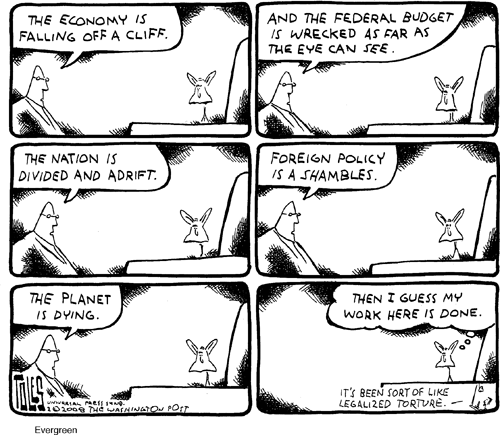

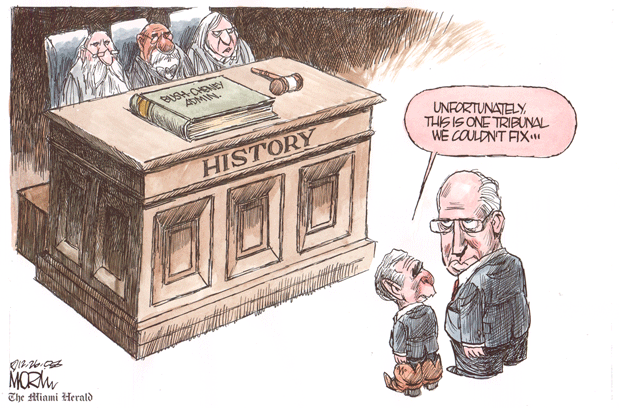
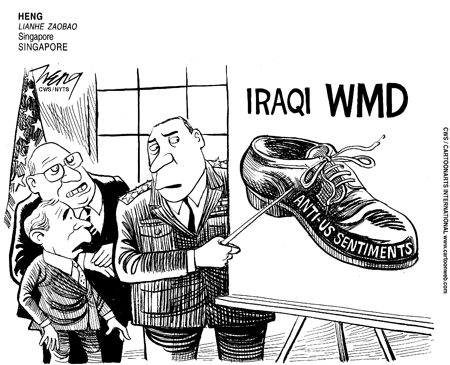


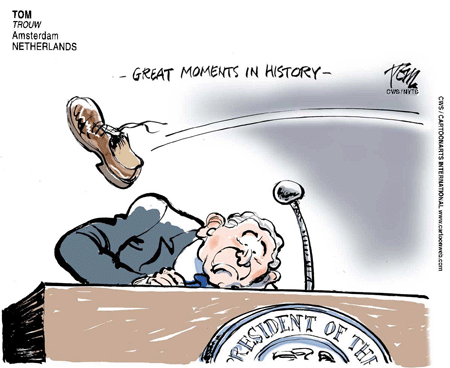
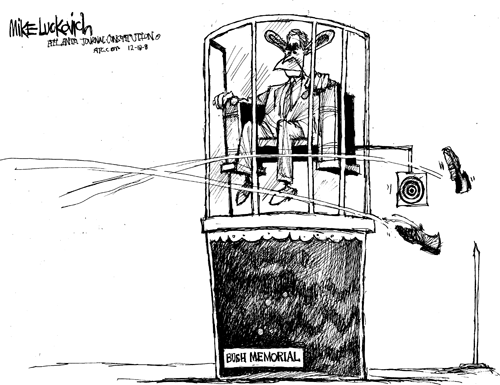

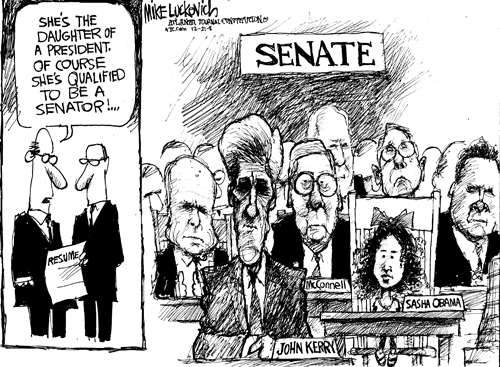

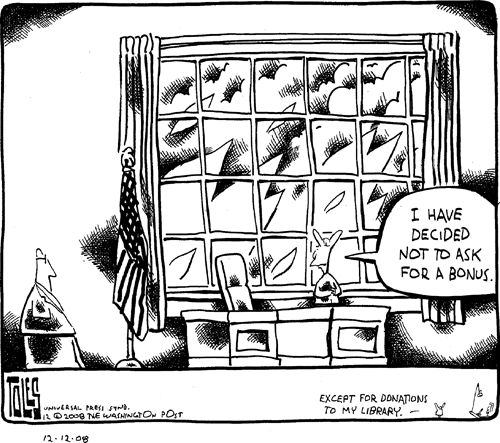
 Former Defense Secretary Donald Rumsfeld and other members of the Bush administration "conveyed the message that physical pressures and degradation were appropriate treatment for detainees," claims a
Former Defense Secretary Donald Rumsfeld and other members of the Bush administration "conveyed the message that physical pressures and degradation were appropriate treatment for detainees," claims a 